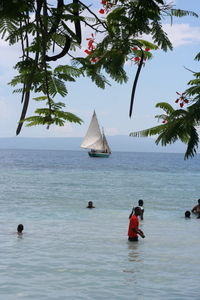 Press Statement Ministry of Health
Press Statement Ministry of Health
Nassau, Bahamas
– The Ministry of Health wishes to report that a person was intercepted at sea and detained at the Detention Centre.The detainee appeared unwell on arrival, was treated for suspected Cholera, and has since been repatriated. There was no contact between the person and the community-at-large.
Laboratory tests later confirmed Cholera.
As reported, Haiti has an increased rate of Cholera. The Ministry of Health continues its heightened surveillance activities and other necessary precautions to identify cases and prevent the transmission of Cholera in The Bahamas.
The public is reminded to use clean water and maintain good hygienic practices to prevent Cholera from spreading.








500,000 cholera cases expected in Haiti by end 2011: WHO
The World Health Organisation on Friday said the number of cholera cases in Haiti was expected to reach 500,000 by the end of the year.
“If current trends continue, we can expect around 75,000 more cases by the end of the year bringing the total to approximately 500,000 cases since the beginning of the epidemic,” WHO spokesman Tarik Jasarevic said.
In October, the WHO had already recorded 470,000 cases.
The cholera epidemic broke out in 2010 when the disease has killed 6,600 people.
The number of new cholera cases in Haiti halved in August, but the rainy season is once again worsening the situation, the WHO warned.
“We are going towards an endemic situation,” noted Claire-Lise Chaignat, who heads the WHO’s anti-cholera group.
“We should consider cholera vaccine introduction to Haiti for the most vulnerable. This discussion is ongoing,” added Chaignat.
“But you can imagine that it is not easy to identify where to start, with the limited amount of vaccines available, because the vaccines are still produced in a very limited amount and quantity,” she said, adding that she hoped this would change with the production of new vaccines in India.
if papa wins the next election you can be sure those same disease carrying foreigners will be right back here to spread
If i was a haitian or for that matter if i was anyone looking for a land of oppurtunity i would come here !Lets face it we Bahamians think Haitians come here to weed yard and mix cement little do we know they have an agenda to take over
What about our Maritime affairs at the borders? Are there adequate boats patrolling our borders to intercept these sloops, some of them so big they are now referred to as Cruiselines or ferries?
How can the man not come into contact with the community? He was at the detention centre which meant a Bahamian RBDF placed him in his quarters. I’m sure he was feed, so someone gave him food, he probably changed clothing, so someone gave him clothes. God help if he had family or friends who went to visit him.
I just don’t trust what information is put out there in the public by this government. Since BIS is no longer available to keep em honest, thank goodness for the Punch and thank Goodness for Media and BahamasPress!
Cholera cases have more than tripled a moth ago, after continual flooding from numerous weather systems nourishing the 40 year old pandemic, in Haiti
PORT-AU-PRINCE, Haiti (AP) — The number of cholera cases seen in the Haitian capital has jumped about threefold in recent weeks, an official with a foreign aid group said Monday.
Pascale Zintzen, deputy head of mission for Doctors Without Borders, said the group’s four treatment centers in the Port-au-Prince metropolitan area have handled as many as 850 cases in a single week lately. That compares with about 250 cases a week more than a month ago.
The rise is largely attributed to the second rainy season of the year, when showers and floods cause the waterborne disease to spread freely in the crowded and unsanitary capital, Zintzen said.
One cholera treatment center in the densely packed Port-au-Prince area of Martissaint has 90 beds for patients but is almost out of space, she said.
“We are not far from it,” Zintzen said by telephone. “We are worried about what we see at the moment.”
Despite the jump in cases, the weekly number is still far below what foreign aid groups saw in the initial peak last November after the disease surfaced a year ago.
Health care workers for Doctors Without Borders treated as many 4,600 patients in one week at its treatment centers in the Port-au-Prince area and about half that number in late May, when the year’s first rainy season kicked in.
There had never been any documented cases of cholera in Haiti until a year ago, when a U.N. peacekeeping battalion from Nepal likely introduced the disease.
Cholera is caused by a bacteria that produces severe diarrhea and is contracted by eating or drinking contaminated food or water. The disease is relatively easy to treat if people can get help in time, but Haiti’s poverty sometimes makes it difficult to find immediate help.
The epidemic has killed more than 6,200 people and sickened nearly 440,000 others, according to Haitian health officials.
Comments are closed.